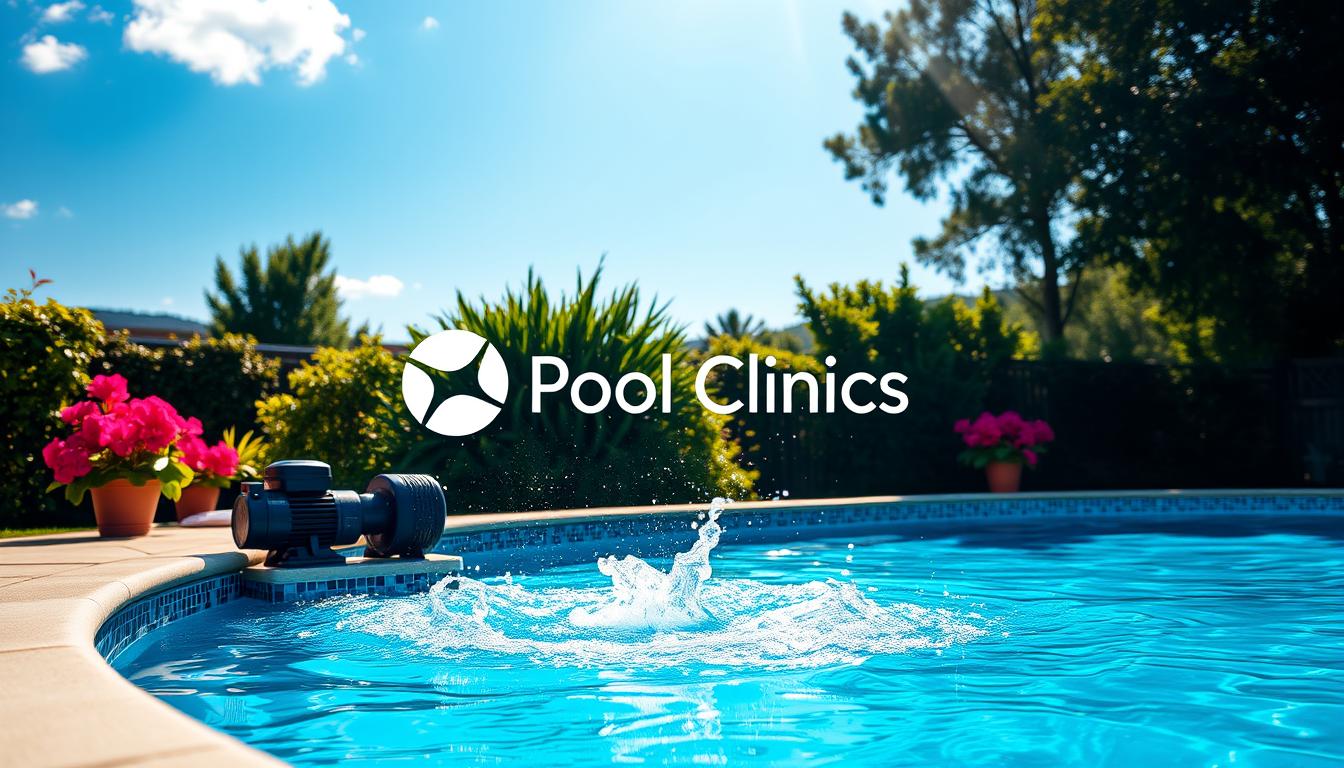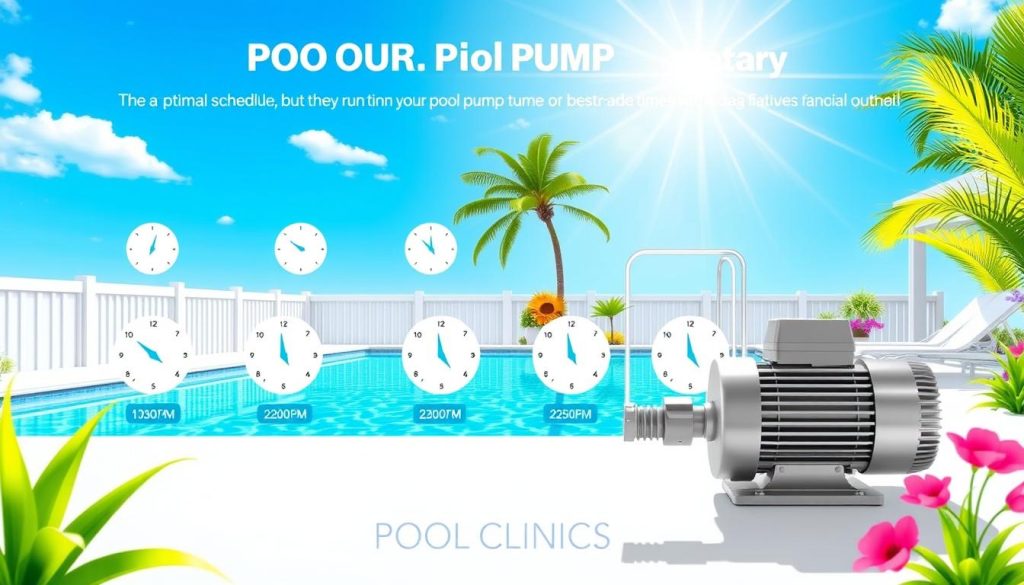
Summer’s here, and it’s time to enjoy your backyard pool. But keeping it clean requires smart strategies. Running your pool pump at the right time is key. This guide will help you maintain a sparkling, healthy pool all summer long.
Daily pool pump operation is crucial in summer. It prevents algae growth and keeps water fresh. In peak summer, run your pump for 8-10 hours daily.
This ensures proper water circulation and chemical distribution. During cooler months or low-use periods, 4-6 hours may be enough. Always adjust based on your pool’s specific needs.
Key Takeaways
- Run your pool pump daily during summer to maintain cleanliness and prevent algae growth.
- Aim for 8-10 hours of pool pump operation per day during peak summer months.
- Adjust pool pump operation hours based on temperature, usage, and weather conditions.
- Consider energy-efficient pool pumping strategies to optimize costs and performance.
- Proper pool pump scheduling is crucial for maintaining a healthy and inviting swimming environment.
Optimal Pool Pump Run Time in Summer
Summer brings challenges for pool owners. They must keep water clear while managing energy costs. Finding the right pool pump schedule is crucial. This balance ensures a pristine pool without overspending.

Factors Affecting Pool Pump Operation
Several factors impact ideal pool pump running time in summer. These include pool size, bather load, climate, and pump efficiency.
- Pool size: Larger pools require longer pump run times to ensure proper filtration and circulation.
- Bather load: The number of daily swimmers affects the demand on the pump’s filtration system, necessitating higher speeds and extended run times.
- Climate: Hotter climates may call for longer pump run times to prevent algae growth and maintain water clarity.
- Pump efficiency: High-efficiency pumps could potentially allow for shorter running times, about one-third to half the duration, compared to older and larger pumps.
Recommended Hours for Running Pool Pump
Summer calls for longer pool pump run times. The average is 12-16 hours daily, up from 8 hours in other seasons. This ensures effective filtration and proper chemical circulation.
Extended run times prevent algae growth and maintain water quality. They also keep your pool looking attractive.
| Pool Size (Gallons) | Pump Flow Rate (GPH) | Minimum Run Time (Hours) |
|---|---|---|
| 10,000 | 2,500 | 4 |
| 20,000 | 3,000 | 6.7 |
| 30,000 | 3,500 | 8.6 |
| 40,000 | 4,000 | 10 |
To find your pool pump’s exact run time, consider pool volume and pump flow rate. Divide pool volume by flow rate. This gives you the minimum hours for one complete pool turnover.
Ideally, residential pools should achieve a full turnover in 4-6 hours. Optimize the pump schedule based on pool usage and maintenance needs.
By optimizing the pump schedule based on pool usage and maintenance needs, energy efficiency can be maximized while keeping the pool in optimal condition.
Regular monitoring is key to maintaining optimal pump performance. Check water quality, energy use, and equipment performance often. Experiment with different schedules and adjust speeds and run times.
This approach can help you achieve desired results. It can also unlock summer pool pump hacks for energy savings.
Energy-Efficient Pool Pump Scheduling
Pool owners can reduce energy costs while keeping their pools clean. Energy-efficient pool pump scheduling helps lower electricity bills and supports eco-friendly practices. Let’s explore strategies to optimize your pool pump usage.
Running Pump During Off-Peak Hours
Run your pool pump during off-peak hours to cut costs. Electricity is priciest between 9 am and 9 pm. Some companies offer discounted rates at night and on weekends.
Using your pump during these cheaper periods can greatly reduce your bills. This simple change can lead to significant savings over time.
Splitting Pump Operation Throughout the Day
Try running your pump for shorter periods multiple times a day. This approach helps circulate water while using less energy. Aim for a total of 8 hours in a 24-hour period.
This method maintains proper water clarity and chemical balance. It’s an easy way to save energy without sacrificing pool quality.
| Pump Speed | Energy Savings |
|---|---|
| 50% RPM reduction | Up to 75% energy savings |
| Variable speed pump | Up to 90% energy cost reduction |
Utilizing a Pool Pump Timer
A pool pump timer can automate your energy-saving efforts. It controls when your pump runs, ensuring operation during cost-effective hours. You can set it to turn on and off at specific times.
This makes it easier to split pump operation and use off-peak rates. A timer takes the guesswork out of energy-efficient scheduling.
“By implementing these energy-efficient pool pump scheduling strategies, we can significantly reduce our pool maintenance costs while still enjoying a clean and inviting swimming environment.” – Pool Maintenance Expert
Balance energy efficiency with proper water circulation and chemistry. Use off-peak hours, split operations, and a timer for best results. These steps lead to a more sustainable and cost-effective pool experience.
Best Time to Run Pool Pump in Summer for Optimal Results
Running your pool pump at the right times is crucial for a clean, healthy pool. Strategic scheduling ensures proper circulation, filtration, and chemical distribution. This approach keeps your pool in top shape during summer.
Circulating Water After Adding Chemicals
Run the pump when adding chemicals like chlorine tablets, shock, or algaecide. This evenly distributes chemicals, preventing concentrated areas that could cause imbalances. It’s vital to run the pump when adding pool shock at night.
Daytime UV rays can quickly burn off shock, reducing its effectiveness. Proper circulation ensures your pool chemicals work as intended.
Maintaining Water Clarity and Chemical Balance
Consistent pump operation maintains water clarity and chemical balance. Run your pump for at least 1 hour per 10°F of air temperature. Increase pump hours when temperatures exceed 90°F to prevent algae growth.
Test pool water weekly to monitor pH, alkalinity, and chlorine levels. Make gradual adjustments to keep the water safe and sparkling. Combine regular pump operation with weekly maintenance tasks.
Skim, brush, and vacuum your pool regularly. Check and clean your filter system often. These habits minimize manual labor and keep your pool inviting all summer long.







